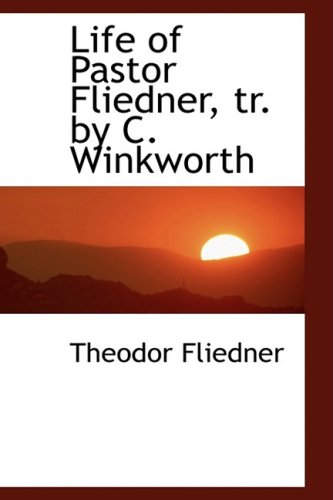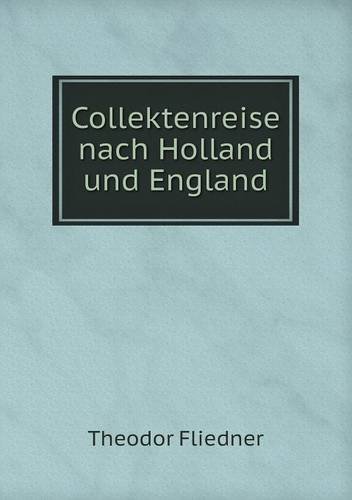Background
He was born on the 21st of January 1800 at Epstein (near Wiesbaden), the small village in which his father was paston.



(This is a pre-1923 historical reproduction that was curat...)
This is a pre-1923 historical reproduction that was curated for quality. Quality assurance was conducted on each of these books in an attempt to remove books with imperfections introduced by the digitization process. Though we have made best efforts - the books may have occasional errors that do not impede the reading experience. We believe this work is culturally important and have elected to bring the book back into print as part of our continuing commitment to the preservation of printed works worldwide.
http://www.amazon.com/gp/product/1103096192/?tag=2022091-20

(Collektenreise nach Holland und England nebst einer ausfu...)
Collektenreise nach Holland und England nebst einer ausfu?hrlichen Darstellung des Kirchen-, Schul-, Armen- und Gefa?ngnisswesens beider La?nder mit vergleichender Hinweisung auf Deutschland, vorzu?glich Preussen. This book, "Collektenreise nach Holland und England", by Theodor Fliedner, is a replication of a book originally published before 1831. It has been restored by human beings, page by page, so that you may enjoy it in a form as close to the original as possible.
http://www.amazon.com/gp/product/5519063559/?tag=2022091-20
He was born on the 21st of January 1800 at Epstein (near Wiesbaden), the small village in which his father was paston.
He studied theology at the universities of Giessen and Gottingen, and at the theological seminary of Herborn, and at the age of twenty he passed his final examination. After a year spent in teaching and preaching, in 1821 he accepted a call from the Protestant church at Kaiserswerth, a little town on the Rhine, a few miles below Dusseldorf.
To help his people and to provide an endowment for his church, he undertook journeys in 1822 through part of Germany, and then in 1823 to Holland and England. He met with considerable success, and had opportunities of observing what was being done towards prison reform; in England he made the acquaintance of the philanthropist Elizabeth Fry, The German prisons were then in a very bad state. The prisoners were huddled together in dirty rooms, badly fed, and left in complete idleness. No one dreamed of instructing them, or of collecting statistics to form the basis of' useful legislation on the subject. Fliedner, at first singly, undertook the work. He applied for permission to be imprisoned for some time, in order that he might look at prison life from the inside. This petition was refused, but he was allowed to hold fortnightly services in the Dusseldorf prison, and to visit the inmates individually. Those interested in the subject banded themselves together, and on the 18th of June 1826 the first Prison Society of Germany (Rheinisch-Westfdlischer Gefangnis Herein) was founded: In 1833 Fliedner opened in his own parsonage garden at Kaiserswerth a refuge for discharged female convicts. His circle of practical philanthropy rapidly increased. The state of the sick poor had for some time excited his interest, and it seemed to him that hospitals might be best served by an organized body of specially trained women. Accordingly in 1836 he began the first deaconess house, and the hospital at Kaiserswerth. By their ordination vows the deaconesses devoted themselves to the care of the poor, the sick and the young; but their engagements were not final-they might leave their work and return to ordinary life if they chose. In addition to these institutions Fliedner founded in 1835 an infant school, then a normal school for infant school mistresses (1836), an orphanage for orphan girls of the middle class (1842) and an asylum for female lunatics (1847). Moreover, he assisted at the foundation and in the management of similar institutions, not only in Germany, but in various parts of Europe. In 1849 he resigned his pastoral charge, and from 1849 to 1851 he travelled over a large part of Europe, America and the East the object of his journeys being to found «mother houses, "which were to be not merely training schools for deaconesses, but also centers whence other training establishments might arise. He established a deaconess house in Jerusalem, and after his return assisted by counsel and money in the erection of establishments at Constantinople, Smyrna, Alexandria and Bucharest. Among his later efforts may be mentioned the Christian house of refuge for female servants in Berlin (connected with which other institutions soon arose) and the «house of evening rest «for retired deaconesses at Kaiserswerth.
In 1855 Fliedner received the degree of doctor in theology from the University of Bonn, in recognition rather of his practical activity than of his theological attainments. He died on the 4th of October 1864.
He left after his death him over 100 stations attended by 430 deaconesses; and these by 1876 had increased to 150 with an attendance of 600.
A sign of the international respect Fliedner garnered is that his most famous pupil came from outside Germany. English nursing reformer Florence Nightingale first visited in 1841. She was impressed by the religious devotion and noted most of the deaconesses were of peasant origin. She graduated from the facility in 1851. Today, one of Düsseldorf's hospitals (Florence-Nightingale-Krankenhaus) bears her name.
(Collektenreise nach Holland und England nebst einer ausfu...)
(This is a pre-1923 historical reproduction that was curat...)
